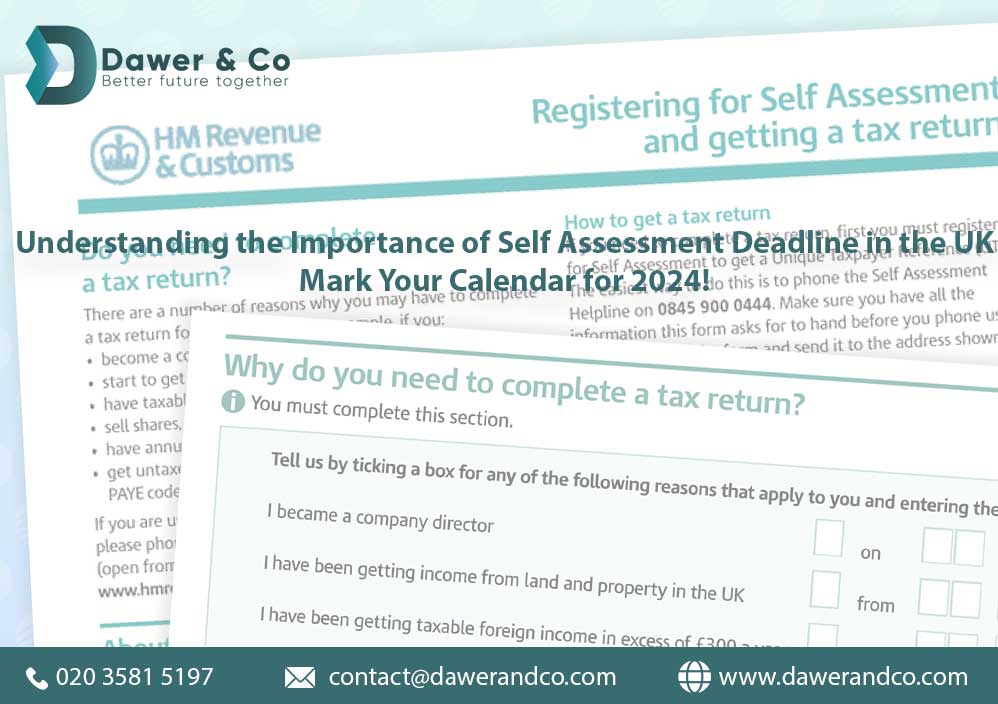Are you tired of rushing through your tax return every year, frantically searching for documents and submitting it just before the deadline? Well, worry no more! We have an important date for you to mark on your calendar – 2024! In this blog post, we dive into the nitty-gritty details of self-assessment deadlines in the UK and why understanding their importance is crucial. So whether you’re a seasoned taxpayer or new to the game, get ready to take control of your finances and say goodbye to last-minute stress. Let’s explore how staying ahead with self-assessment can make all the difference in your financial future!
Introduction: What is Self Assessment in the UK?
Self-assessment is the process of assessing your own Tax and National Insurance contributions. You will need to fill in a self-assessment form if you’re:
- A sole trader
- A partner in a partnership
- A limited company director
- A member of certain other professions, for example, being a barrister or dentist
The tax year runs from 6 April to 5 April. Self-assessment forms for the 2019/20 tax year (the one that ended on 5 April 2020) must be filed online by 31 January 2021. This is known as the ‘self-assessment deadline’.
Understanding the Self Assessment Deadline
Self assessment is the process of calculating and paying your own tax bill, and the deadline for doing this is 31st January.
If you’re self-employed, or a landlord, you’ll need to complete a self assessment tax return every year. This is also true for some people who are employed – for example, if you earn more than £50,000 a year or if you’re a company director.
The first step in completing your self assessment is to register with HMRC. Once you’ve done that, you’ll be sent a tax return form (called a Self Assessment Return) which you’ll need to fill in and send back by the deadline.
The Self Assessment Return asks for information about your income and any taxes that you owe. It’s important to make sure that you include everything that you need to, as failing to do so could result in a fine from HMRC.
Once you’ve completed your Self Assessment Return, you’ll need to calculate how much tax you owe and pay this by the deadline. You can do this online, through your bank, or by post.
It’s important to note that the Self Assessment deadline is different from the tax year end – 31st January falls after the end of the tax year (5th April), so it’s possible that you may need to file two Self Assessment Returns in one year if there’s a change in your circumstances (for example, if you start or stop being self-
Explanation of Why the Deadline is Important
The self-assessment deadline is important for a number of reasons. First and foremost, it ensures that you are compliant with the Self Assessment tax return filing system. Secondly, it helps to avoid any late payment penalties that may be incurred. And most importantly, it provides HM Revenue & Customs (HMRC) with an accurate picture of your financial affairs.
It is important to note that the self-assessment deadline is not the same as the tax return filing deadline. The tax return filing deadline is 31 October, while the self-assessment deadline is usually 31 January. For taxpayers who are required to file a paper return, the deadlines are even earlier – 30 September for the tax return and 15 October for the self-assessment form.
If you fail to meet the self-assessment deadline, you will be subject to late payment penalties. These can be significant, so it is important to make sure that you file your return on time. In addition, HMRC may use estimates of your income and assets when calculating your bill if your return is filed late. This could result in you paying more tax than you actually owe.
Penalties for Missing the Self Assessment Deadline
Finding yourself in hot water with the HMRC is never a fun experience, especially when it comes to money. If you’re one of the millions of people in the UK who are self-employed, then it’s important to stay on top of your Self Assessment tax return deadline.
If you miss the Self Assessment deadline, you’ll be hit with a £100 fine. This is regardless of how much tax you owe – even if it’s just £1. And if you don’t pay your fine within 28 days, you’ll be charged an additional 5% on top of what you owe.
But it doesn’t stop there; if you still haven’t paid after six months, another 5% will be added on. And if it takes longer than a year for you to finally cough up the cash, then you’ll be slapped with yet another 5% charge. So as you can see, it’s pretty important to make sure you meet that Self Assessment deadline!
How to Prepare For The Self Assessment Deadline in 2024
As the self assessment deadline approaches, it’s important to be prepared. Here are some tips on how to get ready for the 2024 deadline:
- Know the deadline. The self assessment deadline is April 5th, 2024. This is the date by which you must file your self assessment return or face a late filing penalty.
- Gather your information early. Start collecting the documents and information you need to file your return well in advance of the deadline. This will make the process much easier and help you avoid any last-minute rushes.
- Use a tax return software. Filing your return online is quick and easy, and it can help you avoid mistakes that could lead to penalties. We recommend using HMRC’s own Self Assessment Online service, but there are plenty of other options available.
- Get help if you need it. If you’re not confident in your ability to file your return correctly, there’s no shame in seeking professional help from an accountant or tax advisor. They can make sure everything is done correctly and help you claim any deductions or reliefs you’re entitled to.
- Make sure you pay on time. Once you’ve filed your return, don’t forget to pay any tax due by the due date (usually 31st January). If you don’t pay on time, you’ll be charged interest and may also face penalties.
By following these simple tips, you can ensure that you’re prepared
Taking Action Ahead of The Filing Deadline of 2024
It’s important to take action ahead of the 2024 filing deadline to ensure you’re compliant with Self Assessment in the UK. Here are some tips on what you can do:
– Speak to an accountant or tax advisor to get an understanding of your Self Assessment obligations.
– Make sure you’re keeping accurate records of your income and expenses.
– Use software or online services to help you keep track of your Self Assessment filings.
– Stay up to date with changes to Self Assessment requirements by regularly checking HMRC’s website.
Conclusion
Self assessment deadlines in the UK are a crucial part of filing taxes and meeting legal obligations. Understanding these dates is essential, since missing them can lead to hefty fines and penalties. We hope this article has been helpful by providing an overview of self assessment deadlines, as well as tips on how to keep track of those dates in the future. With April 2024 being the most important deadline for all taxpayers in the UK this year, make sure to mark your calendar and stay on top of things!






